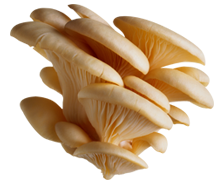
- Address : P.O. Box 11, Gannoruwa rd, Peradeniya, Sri Lanka
- E- Mail : director.hordi@doa.gov.lk
- Telephone :(+94) 081-2388011-12-13
- Fax :(+94) 081-2388234

Oyster Mushrooms (American oyster/ Abalone/ Pink oyster)
Pleurotus ostreatus /Pleurotus cystidiosus /Pleurotus angustatus
- Oyster mushrooms can be grown on substrate which contain lignin, cellulose and hemicelluloses
- Substrate preparation for oyster mushroom is very simple.
- It does not require controlled environmental conditions and have very wide temperature, relative humidity and CO2 tolerance
- Cultivation steps
- Preparation of spawn.
- Substrate preparation.
- Substrate sterilization
- Spawning of substrate
- Crop management
Released Varieties
Climatic requirements/ Areas suitable for cultivation
American oyster
| T0 C | RH% | CO2 (ppm) | Light (lux) |
Spawn run | 24-27 | 90-100 | 20,000 | Total dark |
Primodia formation | 17-19 | 95 | 600 | 2000 |
Fruiting body formation | 19-20 | 85-92 | 600 | 2000 |
Abalone
| T0 C | RH% | CO2 (ppm) | Light (lux) |
Spawn run | 24-30 | 90-95 | 5,000-20,000 | Total dark |
Primodia formation | 18-24 | 95-100 | 500-1000 | 500-1000 |
Fruiting body formation | 21-27 | 85-90 | <2000 | 500-1000 |
Pink oyster
| T0 C | RH% | CO2 (ppm) | Light (lux) |
Spawn run | 24-27 | 90-100 | 20,000 | Total dark |
Primodia formation | 17-19 | 95 | 600 | 2000 |
Fruiting body formation | 19-20 | 85-92 | 600 | 2000 |
For spawn run –Incubation room
For primodia formation and fruiting body formation – Cropping house
Substrate
Saw dust Media for Oyster mushrooms
For 50 packets
Saw dust 20kg
Rice bran 2kg
CaO 400g
Soya flour 200g
MgSO4 40g
Other requirements
- 200 gauge polypropylene bags (7” width and14” height)
- ¾” width and ½” height PVC pipes
- Rubber bands
- Cotton waste/cotton
Pest Management
- Mushroom flies (Bradysia, Cecid fly, Phorid fly, Sciarid flies)
- Lycid beetle
- Mites
Controlling
- Construct a standard cropping house with insect proof net
- Proper cropping house sanitation
- Use of neem water extract
- Use of garlic, neem extract
- Use of sulphur containing insecticide for mites
Disease Management
Fungal diseases :
Trichoderma spp. infection –Green color mould
Aspergillus niger infection – Black color mould
Controlling :
- Use of standard saw dust, rice bran and cotton waste
- Proper sterilization of bags
- Should be used disease free spawns
- Inoculation should be done under sterilize condition
- Proper management of temperature and humidity during growing period
- Removal and discard of infected bags
Control of bacterial infections
Regular application of chlorinated water containing 10g/1litre water of freely available chlorine at an interval of 3 – 5 days
Spawn requirement
200g grain (rice) spawns for 50-60 packets
Incubation
American Oyster and Pink Oyster : 20-30 days in incubation room
Abalone : 45-60 days in incubation room
Transfer the cropping house
After completion of the spawn running
Opening the packets
Fully open or half open (for high temperature areas)
Water supply
Watering should be done as a mist or humidifiers can be used
Harvesting
- The fruit bodies should be harvested before spore release, by twisting
- pick all the mushrooms at one time from a pot
Yield
300-400 g fresh mushrooms/pot
